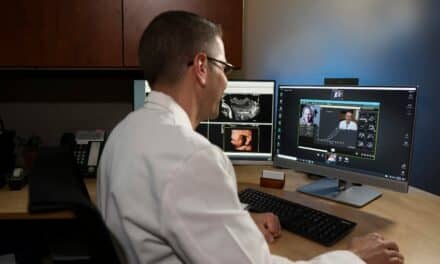Using Transpara breast AI further confirmed the enormous contribution of this technology to breast cancer detection: not only to reduce the number of false positives but also to reduce radiologists’ workload by over 60%.
In Copenhagen, the biannual breast screening program for women aged from 50 to 69, has been running for over 30 years. Mammograms in the screening program are currently double read which helps to maintain cancer detection and accuracy.
Using Transpara, developed by ScreenPoint Medical, the team in Denmark led by Head of Copenhagen Screening Program, Ilse Vejborg, set out to improve accuracy and efficiency for the current screening program.
In their real-world study published in Radiology, 114,421 screening examinations were evaluated. The team found that AI-based screening sensitivity was similar to radiologists (69.7% vs 70.8%) but when it came to false positives, the AI-based approach outperformed regular double reading. Using AI resulted in 25.1% fewer false positives.
Using the unique Transpara Exam Score and calibration, the team demonstrated the ability reduce radiologists’ workload by up to 62.6%. This finding further confirms other peer reviewed publications featuring Transpara from Norway, Sweden and Spain.
The study concluded that, “Artificial intelligence (AI)–based screening could detect normal, moderate-risk, and suspicious mammograms in a breast cancer screening program, which may reduce the radiologist workload. AI-based screening performed consistently across breast densities.”
As a result of this ground-breaking study, the breast screening program in Copenhagen has now implemented Transpara breast AI prospectively into their screening program to improve efficiency and accuracy.
Ilse Vejborg said, “This large retrospective study was fundamental in giving us the clinical confidence and knowledge. Now that we have more hands-on experience, we are increasingly trusting the AI system. The preliminary results are impressive. We will off course continue to have a firm quality control but expect to have the same high detection rate with an equal or even fewer false positive rate.”
Mark Koeniguer, Chief Executive Officer of ScreenPoint Medical said, “Transpara is now being used prospectively in multiple countries helping with workload and early cancer detection. We are delivering on our promise to bring the benefits of AI to the fight against breast cancer.”
Rachel Brem adds, “The integration of Screenpoint’s Transpara AI in clinical practice is a ground-breaking advance in the detection of breast cancer by reducing both radiologist workload and improving specificity and accuracy of mammography. It should be integrated in all practices to achieve these highly needed improvements.”
[Source(s): ScreenPoint Medical, PR Newswire]






